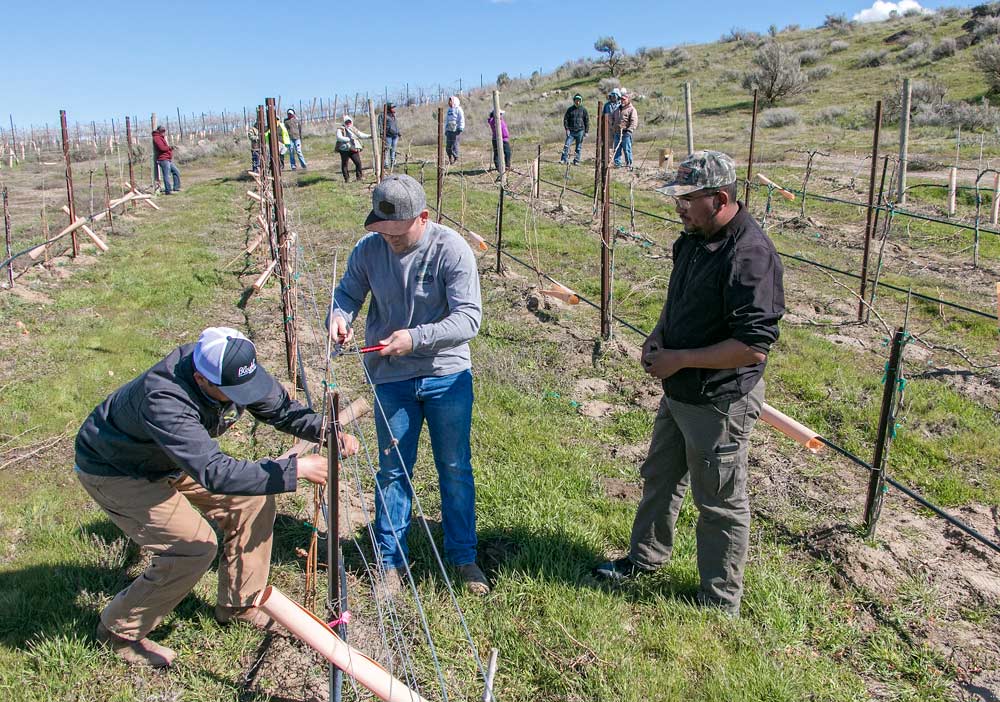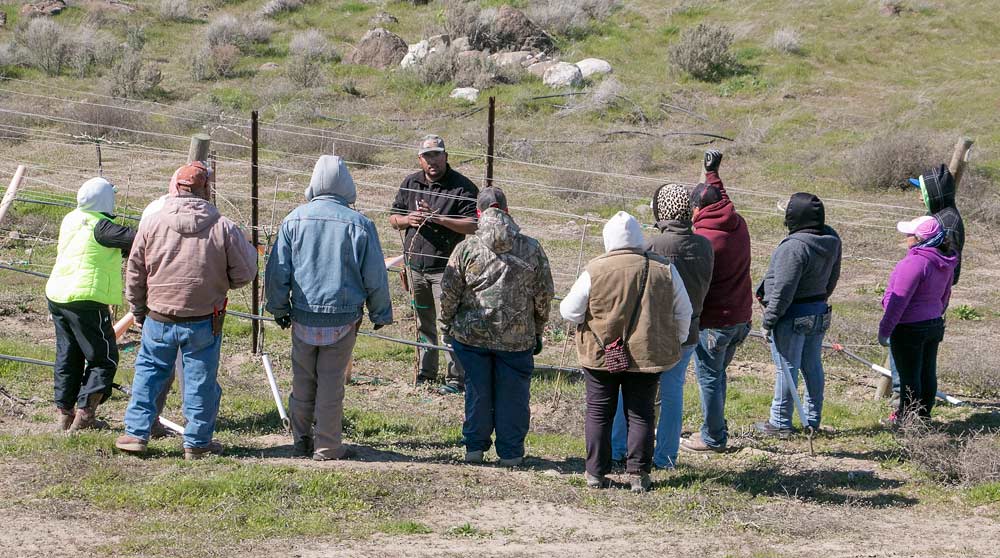
Vineyard manager Nick Mackay, center, and vineyard foreman Enrique Moreno, left, discuss pruning and tying strategies with new crew boss Luis Ruelas, while workers wait for instructions at Mercer Canyons in Alderdale, Washington, in March. (Ross Courtney/Good Fruit Grower)
When new crew boss Luis Ruelas prepared to lead his workers in tying vines in a Syrah block at Mercer Canyons, his own supervisors didn’t just turn him loose.
Vineyard manager Nick Mackay and vineyard foreman Enrique Moreno spent several minutes discussing the technique and strategy with Ruelas before they let him explain it to his workers, supplied him with tape and bamboo stakes, and stuck around to help while the team got started.
Supporting new supervisors in front of workers is one way to teach them how to communicate and manage, Moreno and Mackay said, echoing the advice of labor consultants and professors in how best to train workers who get promoted to management.
“Supervisory skills are learned,” said Leo Garcia, lead faculty for the Hispanic Orchard Employee Education Program of Wenatchee Valley Community College in Wenatchee, Washington. People don’t just automatically acquire them with a new title.
“A lot of people assume that just because you’re a good person and you’re fair and you’re a hard worker and loyal and all that, and all the attributes of a good employee, you can jump right into managing people,” he said.
The program, as well as its vineyard-specific subcategory, Latino Ag Education Program, covers management and communication skills alongside the technical aspects of pruning, thinning and chemical applications.
Mercer Canyons and other employers routinely send workers, especially those targeted for supervisory roles, to the classes, held on Fridays.
In fact, several winery and vineyard owners attended a graduation ceremony of the Latino Ag Education Program in March, posing for photos with their workers.
Complaints of mistreatment that attract the attention of union organizers and legal-aid groups typically start with low-level or mid-level managers, said Raul Calvo, a California labor consultant, at a March conference in Yakima, Washington.
To avoid that, he said, teach new supervisors the “soft skills” of management, communication and conflict resolution.
“Those skills are harder to measure, but we need to develop them,” Calvo said at the annual meeting of Wafla, a Lacey, Washington,-based farm labor nonprofit.
Calvo cited a University of California master’s thesis project in which 50 students interviewed more than 1,000 field workers about what they wanted from their company.
Money was high on the list, but not at the top. The results were, in order of importance, respect, lack of favoritism, recognition, benefits and wages.
Calvo stressed a few interpersonal guidelines for new supervisors: Don’t try to be friends with workers. Call employees by name. Don’t use nicknames, even if you know them. And don’t swear, even if you did in the past.

Crew boss Luis Ruelas instructs his workers how to tie vines. Moreno, not pictured, stayed with the crew for a while to help foster mutual respect between Ruelas and his workers. (Ross Courtney/Good Fruit Grower)
At Mercer Canyons’ vineyard in Alderdale, Washington, Mackay tries to avoid the interpersonal drama between new crew bosses and workers by placing bosses with workers they don’t know as well as others.
Mercer Canyons participates in the Wenatchee Valley College program, but also holds a weeklong, on-farm training for all new supervisors on management of both vineyards and people.
The training covers different learning styles of employees, patience, how to lead with positive comments when correcting someone and, above all, explaining the overall goals of the farm when giving instructions.
“People tend to take better to communication if you tell them why you are asking them to do something,” Mackay said. •
– by Ross Courtney






Leave A Comment